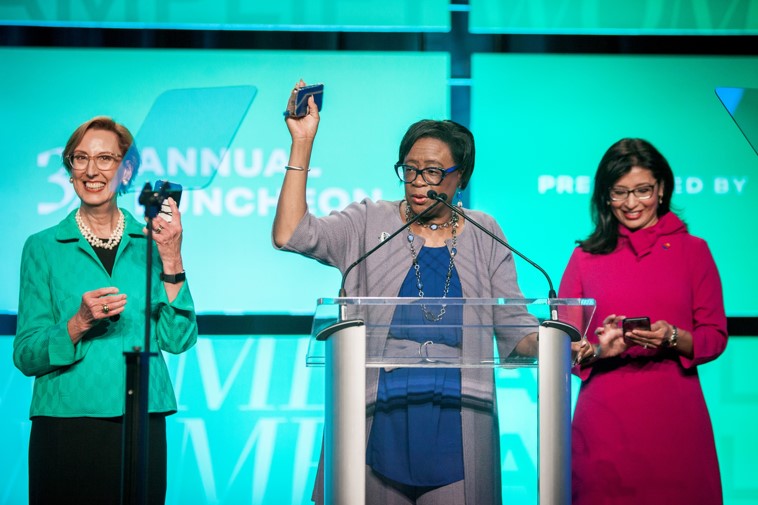Via: My Sweet Charity
By: Glenn Hunter
The annual luncheon of the Texas Women’s Foundation is always an inspiring, high-energy affair, and the 34th edition on Thursday, November 14, at the Hilton Anatole proved the rule. How could it have been otherwise, with TWF board member Cynt Marshall — renowned for her energetic onstage dance moves — and featured speaker Elaine Welteroth, a pioneering journalist, editor and author, in the house?
The event, co-chaired by Janiece Evans-Page and Virginia Rose-Harris, was also attended by 200 girls from middle and high schools throughout North Texas. They experienced the luncheon via livestream in a room adjacent to the ballroom, and later heard from Elaine and TWF leaders in person.
Just before the meal was served — think red-beet salad, potato gnocchi with chicken, and an array of miniature desserts — Cynt, CEO of presenting sponsor the Dallas Mavericks, and Roslyn Dawson Thompson, TWF’s president and CEO, took the stage for a call to arms of sorts. Referring to each other as “my sister,” the two expressed their mutual support and admiration. “We have to come together to inspire change,” Cynt proclaimed, to which Ros chimed in, “That’s why we picked ‘Amplify’ as our theme!”
A little later it was time for a conversation between Elaine and Laysha Ward, an executive vice president at the luncheon’s speaker sponsor Target (sometimes known as “Tar-zjay,” Laysha joked). Elaine, whom Laysha called a “bad sister” in her introduction, is the author of the New York Times-bestselling book “More Than Enough.” According to the luncheon program notes, the book “unpacks insights on barrier-breaking, identity and race for those seeking to claim space in the workplace and the world on their own terms.”
The daughter of a white father and an African-American mother, Elaine was named editor-in-chief of Teen Vogue in 2016. That made her only the second African-American to hold such a title in the nearly 110-year history of Condé Nast, Teen Vogue‘s parent company. She left the magazine early in 2018.
During her talk with Laysha, Elaine touched on a variety of topics.
- Asked to explain the title of her book, Elaine said that, according to the experts, “girls’ confidence peaks at age 9. It’s so ingrained for women and girls to ‘shrink.’ You have to believe that you’re enough, just as you are!”
- “My mom is everything,” Elaine said. “She’s actually the hero of this book and of my story.” Her first memory of her mother, she said, came when she was asked to make a “family collage” in school and, flipping through various magazines, “couldn’t find anything that looked like my mother, or me, or my brother.” So, she cut out photos of white people. Her mother took one look at Elaine’s finished collage, said “Houston, we have a problem,” and “pulled out Ebony magazine” and invited Elaine to re-do the assignment. Her mother re-framed the project, she said, turning shame into pride. “I’m biracial, but the world will see me as black,” Elaine said. Her mother “gently guided me” into a sense of confidence and self-esteem.
- She’s comfortable now being “the only brown girl in the room,” Elaine said, and she identifies with the expression FOD: “First. Only. Different.” (Said Laysha, “I feel ya.”) As a person of color, Elaine went on, “When everybody else is giving 50, 80, 90 percent, you have to give 250 percent to have equal respect.”
- “I think we all have a zone of genius,” Elaine said. “You have to identify what that is, and then put it to use for your organization and the community. … Women finally have the opportunity to define what power looks like. We don’t have to behave like men. We have the opportunity to bring more feminine qualities into the male.
Toward the end of their talk, Elaine and Laysha were joined onstage by two members of TWF’s Young Women’s Advisory Council, Ivis Andrade and Misaki Collins. Answering their questions, Elaine said that “transitions are opportunities for growth,” emphasized the importance of choosing good mentors, and advised the girls to “be patient” while keeping an “entrepreneurial mindset” in their lives.
To close out the luncheon, TWF Board Chair A. Shonn Brown took the stage. “It’s still shy of 1 o’clock, because women do things on time,” Shonn proclaimed with a smile. Then she disclosed that 60 people had donated $1,000 to TWF so far, adding that, “we’d like to get to 100 people.” Finally, Shonn said, “We are going to dance our way out.”
So, the event ended just as it had begun—this time to the tune of “I’m Every Woman” by Chaka Khan.

